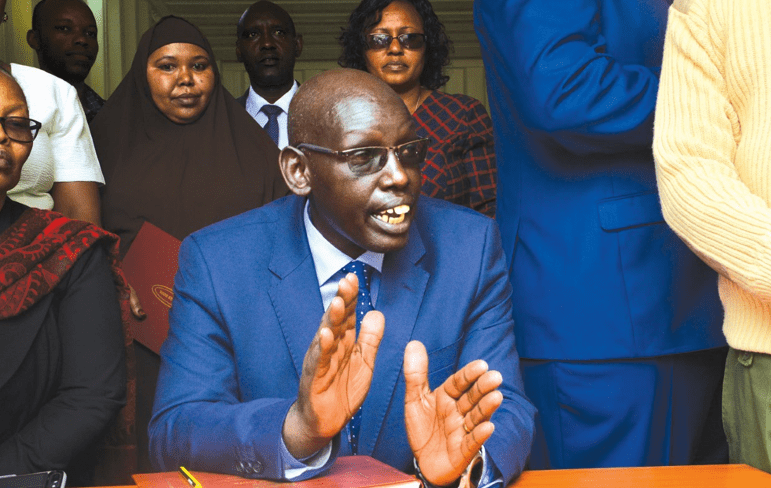Kemis system launched two months ago yet to be operationalized
By Milliam Murigi, September 24, 2024Two months after former Education Cabinet Secretary Ezekiel Machogu launched the new education management system known as the Kenya Education Management Information System (KEMIS), it is yet to be operationalized.
Speaking during the launch of the 2024 Edtech Summit, Dr Belio By Kipsang, Principal Secretary, Ministry of Education attributed the delay to the expansion of the National Education Management Information System (NEMIS) to include all levels of education which requires significant investment in infrastructure, capacity building, and cybersecurity.
“The National Education Sector Strategic Plan (NESSP) 2023-2027, a blueprint for the future of Kenya specifically identifies risks such as system weakness and technical capacity constraints, which we must address to ensure the long-term success of these platforms,” said Kipsang in a speech read on his behalf by Francis Karanja, Head National ICT, Innovation and Integration Centre, Ministry of Health.
The EdTech Summit is a platform that brings together individuals, organizations, or companies that develop and implement technology-driven solutions to improve and transform education to connect, collaborate, and share insights on how technology can enhance education.
It provides an opportunity for stakeholders, including educators, developers, policymakers, and investors, to explore emerging trends, showcase innovative solutions, and discuss strategies for leveraging technology to improve learning outcomes and transform education systems globally.
Kipsang stated that to fast-track the process, the government is seeking support from all stakeholders—development partners, the private sector, civil society, and educational institutions. Their collaboration is essential in building a robust ecosystem that promotes data-driven education, enhances digital infrastructure, and equips educators with the necessary skills and resources.
“NESSP calls for the development of public-private partnerships to bridge financing gaps in education. With a projected budget shortfall, the ministry seeks to collaborate with non-state actors to mobilize resources and ensure the smooth transition to KEMIS.”
Through public-private partnerships and strategic alliances, the aim is to bridge financing gaps, mobilize resources, and ensure the effective implementation of educational initiatives. This collective effort will help address challenges while maximizing opportunities for a more inclusive and efficient education system.
He adds that fully integrating KEMIS into the country’s education framework, will ensure that every decision made by the government is informed by data, and every action taken brings the country closer to a more equitable and prosperous future for Kenya’s learners.
Unlike NEMIS which is currently supporting the digital registration of learners in primary and secondary levels, KEMIS will include all learners from pre-primary to Technical and Vocational Education and Training (TVET), and higher education institutions. This inclusion will broaden the understanding of the entire education ecosystem and ensure that all sectors are adequately supported.
“As we expand these systems, however, we must also address challenges such as system maintenance, security, and capacity constraints. A robust legal and institutional framework is underway to protect the integrity of these systems,” he said.
NESSP 2023-2027 lays out a comprehensive vision to provide equitable access to quality education across all levels from pre-primary to higher education. Central to this vision is the use of data-driven decision-making. Since KEMIS will ensure data is available, government will ensure that all education-related decisions are informed by real-time information, helping to address disparities in resource allocation and improve the overall quality of education.
Under NESSP, data is not merely a tool for monitoring progress—it is a critical driver of policy formulation. This is why the plan emphasizes the integration of Monitoring, Evaluation, and Reporting (MER) mechanisms across all education programs. By implementing these systems, the government can systematically assess the impact of various initiatives and make necessary adjustments to ensure their effectiveness.
